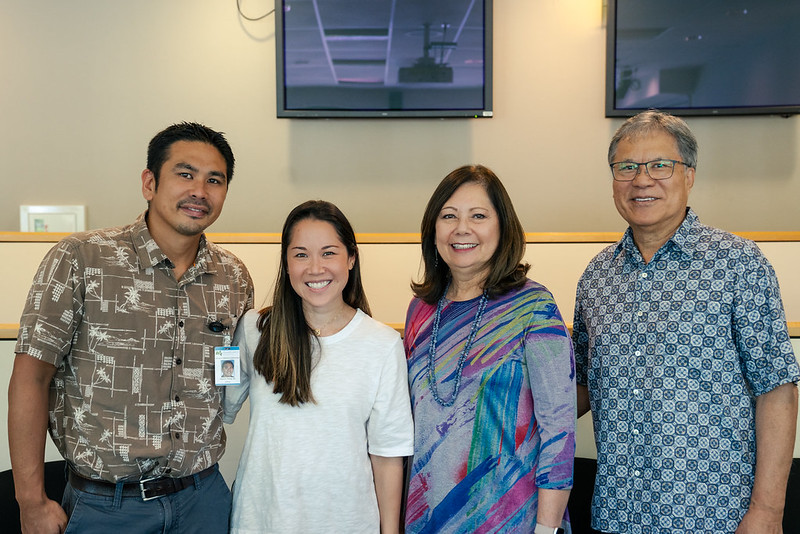It was under the blazing sun, just makai of Nimitz Highway, that Anne Nohara Abaya and her husband Allen had a serendipitous encounter with a stranger that led them to the John A. Burns School of Medicine (JABSOM). The couple, who have a heart of giving, were volunteering with the Hawaiʻi Community Foundation at Kahauiki Village, helping to clean and prepare the units so that they would be move-in ready for previously houseless families. That’s when a fellow volunteer spoke to them about the Dr. Rosita Leong Mini-Medical School on Healthy Aging – just 10 minutes down the road. Later, as a participant of the JABSOM Mini-Medical School, Anne learned about the staggering shortage of geriatricians that has designated geriatric medicine as a federal critical shortage specialty.
Nationally, the demand for geriatricians is estimated at 30,000, yet the U.S, falls short with fewer than 7,000 practitioners. This leaves a crucial gap in healthcare services as the elderly population expands. Professor and Chair of the Department of Geriatric Medicine at the University of Hawaiʻi (UH) JABSOM Dr. Kamal Masaki recognizes the paradox: “It’s very sad because I think older patients could really benefit from this expertise.”
In Hawaiʻi, the demand for geriatricians far outpaces the supply: Hawaiʻi holds the title of highest life expectancy in the nation at 80.7 years, along with the highest percentage of residents aged 85 and older, according to recent U.S. Census data.
“It was eye-opening,” said Anne. “Hawaiʻi has so many seniors– how much better would things be if we had more geriatricians?”
Compelled to provide a solution, the couple established two pilot programs to support geriatric care in Hawaiʻi: The Nohara-Abaya Loan Repayment and Scholarship Award and the Nohara-Abaya Curriculum Support Fund.
The Nohara-Abaya Loan Repayment and Scholarship Award recipients receive $50,000 towards student loan relief and/or financial support – providing an opportunity for young doctors facing financial barriers to pursue their passion for geriatric care in favor of choosing a more lucrative specialty in order to quickly pay off student debt. The award also encourages medical students and residents to pursue a career in Geriatric Medicine. The UH Geriatric Medicine Fellowship is one of the largest programs of its kind in the country. In fact, the fellowship program boasts a remarkable record of nearly half of its graduates choosing to practice in Hawaiʻi and the Pacific Region.

Born and raised in Hawaiʻi, Dr. Kathryn Kianalani Choo Loy, JABSOM geriatric medicine fellow, cannot imagine practicing anywhere else and is grateful to be one of first recipients of this award. “My hope is that I can be a support system for my patients who are going through so many transitions at their age, and need someone with patience and compassion to help them remain not just healthy– but happy as well,” said Choo Loy. “I am also passionate about making sure caregivers are taken care of too and will think of their health and wellbeing as part of my responsibility as well.”
The goal of the second pilot program established by the Abayas is to inspire and encourage more Advanced Practice Registered Nurses, or APRNs, to become experts in caring for the elderly. The Nohara-Abaya Curriculum Support Fund will be used to create a unique program for nurse practitioners that exposes them to the geriatrics specialty through interprofessional education and collaboration with JABSOM medical students. The program is administered by the JABSOM Department of Geriatric Medicine but will be available to nurse practitioner students enrolled across three institutions including UH Mānoa, Chaminade University and Hawaiʻi Pacific University. This program pays homage to the memory of a special nurse, whom the couple remembers, provided exceptional care to Anne’s mother during the last periods of her life.
Choo Loy recalls seeing this multidisciplinary approach to patient care firsthand when her grandmother had received care in the hospital. “How amazing it is to live on an island where it is so easy to collaborate with different multidisciplinary providers that make up a patient’s care. My grandmother was supported very well throughout her diseased state and transitioned smoothly into palliative care because of this team approach,” said Choo Loy.
With these two pilot programs underway, Masaki is thrilled for the future of geriatric care in Hawaiʻi. And it all began with the Abaya’s desire to give back to the community and after participation in the JABSOM Mini-Medical School.
“They’re a wonderful couple, they want to help the community, they see the needs that are there and they figured out a way that they can give back and I’m so thrilled,” said Masaki of Anne and Allen’s generosity. “The more people that go into the field of geriatrics, I think it’ll be better for our community.”